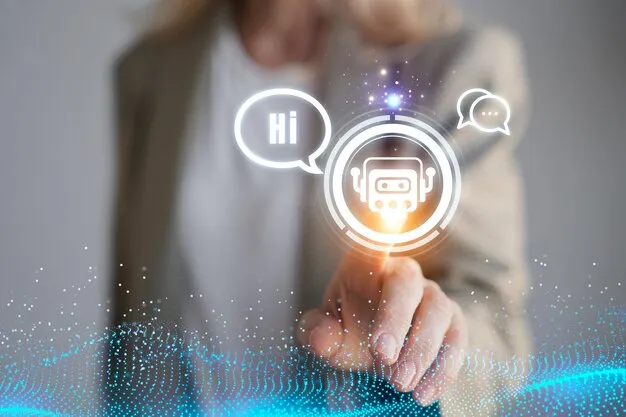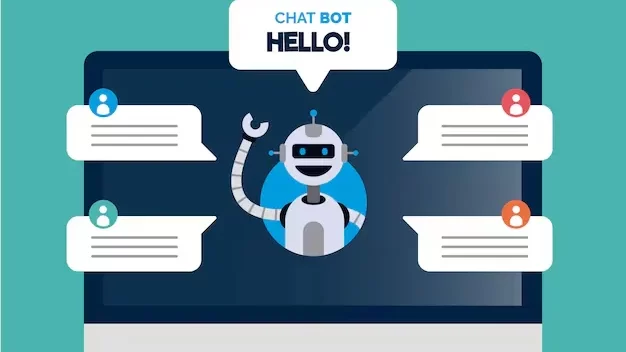Artificial intelligence (AI) continues to revolutionize the way businesses operate, and AI chatbots are at the forefront of this transformation. From improving customer experiences to optimizing business workflows, chatbots have become an indispensable tool across industries. But how exactly do these chatbots work, and why are they such a game-changer for the future of automation? Let’s explore the development of AI chatbots, their underlying technology, and their many industrial applications.

What Are AI Chatbots and How Do They Work?
AI chatbots are automated programs designed to engage in human-like conversations. They aren’t just simple “if-then” response systems; they leverage cutting-edge technology such as natural language processing (NLP) and machine learning (ML) algorithms to understand and respond to user queries dynamically.
Natural Language Processing (NLP)
NLP is the backbone of AI chatbot development. It enables chatbots to understand, interpret, and generate human language. This involves tasks such as:

- Tokenization: Breaking down sentences into words or phrases.
- Sentiment Analysis: Detecting the emotional tone behind messages.
- Entity Recognition: Identifying key components of a query (e.g., dates, names, locations).
For example, when a user types “What’s the weather in New York today?”, the chatbot identifies “weather” and “New York” as key entities and uses APIs to fetch accurate data.
Machine Learning (ML)
Machine learning allows AI chatbots to learn from past interactions and improve over time. For example, if users frequently ask similar questions, the chatbot learns to provide more accurate and informative answers by refining its internal algorithms.
Pre-trained Models
AI chatbots often use pre-trained models like OpenAI’s GPT-4 or Google’s BERT to understand and generate contextually appropriate responses. These models are trained on vast datasets of text and have a deep understanding of language nuances.
Put simply, while a traditional rule-based chatbot is limited by its programming, an AI chatbot evolves with every interaction, offering a level of intelligence that feels almost human.

The Use Cases of AI Chatbots in Various Industries
AI chatbots are redefining operations in industries like healthcare, e-commerce, finance, and beyond. Here’s how they’re making an impact:
Healthcare Industry
AI chatbots are enhancing patient care and streamlining administrative tasks.
- Patient Assistance: Virtual assistants like Florence remind patients to take medications and provide health tips.
- Booking Appointments: Chatbots integrated with calendars make scheduling easier for both patients and medical staff.
- Preliminary Diagnosis: Symptom-checking bots like Babylon Health offer potential diagnoses and recommendations, reducing pressure on emergency services.
E-commerce and Retail
For e-commerce businesses, where personalized customer experience is key, chatbots are proving invaluable.
- Customer Support: Tools like Zendesk integrate chatbots to resolve queries instantly.
- Product Recommendations: AI chatbots analyze user behavior to suggest relevant products with personalized recommendations.
- Order Tracking: Customers can check their order status in seconds, enhancing convenience and reducing customer service workload.
For instance, many fashion websites now use chatbots to recommend complete outfits based on individual preferences.
Finance Industry
AI chatbots in finance are automating repetitive tasks while maintaining high levels of data security.
- Account Assistance: Chatbots like Erica by Bank of America provide insights into account activity and spending habits.
- Fraud Detection: Chatbots flag unusual transactions and notify users promptly.
- Loan Applications: Automated bots guide customers through the loan eligibility process seamlessly.
Education and e-Learning
The education industry is increasingly adopting chatbots to improve learning outcomes.
- 24/7 Support: Students can get answers to their academic questions anytime.
- Personalized Learning: AI chatbots recommend resources and assignments based on the student’s learning style and progress.
- Language Tutoring: Platforms like Duolingo use AI-driven chatbots to simulate real-life conversations for language practice.
Supply Chain and Logistics
Chatbots are even playing a role in optimizing supply chain operations.
- Inventory Management: Chatbots track stock levels and notify teams about replenishment needs.
- Shipment Tracking: Businesses like FedEx offer AI-powered shipment update services via chat.
- Customer Interactions: Standard queries like “Where’s my order?” are handled automatically.
Travel and Hospitality
For an industry centered on customer satisfaction, chatbots are enhancing experiences at every step.
- Booking Assistance: Travelers can book flights, hotels, and car rentals via conversational bots.
- Personalized Itineraries: Chatbots create custom travel plans based on user interests.
- Customer Support: From lost luggage to last-minute room changes, chatbots resolve issues quickly, improving customer retention.
Why Chatbots Represent the Future of Automation
AI chatbot development is more than just a trend—it’s a glimpse into the future. Chatbots offer businesses not only efficiency but also cost savings and scalability.
Enhancing Efficiency
AI chatbots handle thousands of queries simultaneously without compromising response quality. This reduces the need for human intervention in routine tasks, allowing teams to focus on strategic initiatives.
Cost-Effectiveness
Once implemented, AI chatbots significantly reduce operational costs. For example, a chatbot can provide customer service at scale without the overhead of 24/7 staffing—ideal for global businesses.
Scalability
Chatbots can seamlessly grow with a business. Whether handling 100 or 100,000 queries a day, they remain consistent, reliable, and highly productive.
Personalization at Scale
One of the most exciting aspects of AI chatbot development is its ability to deliver personalized experiences—something that’s invaluable in today’s customer-centric world. Personalized AI interactions build brand loyalty and trust, creating competitive advantages for businesses.
Building Trust Through Transparency and Security
Despite the tremendous benefits, businesses must focus on ethical AI practices when developing chatbots. Transparent data usage policies, robust security measures, and clear disclosure of AI interactions help build trust with users.
For instance, businesses should always make it clear when customers are interacting with a bot.
FAQs
How long does it take to develop an AI chatbot?
The development timeline depends on the complexity and features of the chatbot. Simple bots can be built in weeks, whereas advanced bots may take months.
Are chatbots expensive to implement?
While initial costs may seem high, the long-term savings outweigh the expenses. Many scalable solutions are now more affordable for small businesses.
Can a chatbot understand multiple languages?
Yes! AI chatbots can be trained to handle multilingual conversations, making them perfect for global businesses.
The Road Ahead
The future of automation is here, and AI chatbot development is leading the charge. With their ability to boost efficiency, improve customer experiences, and scale operations, chatbots are driving progress across industries.
If you’re ready to bring the power of AI to your business, start small. Experiment with deploying your first chatbot and witness firsthand the benefits of automation. To take it one step further, invest in an AI-powered platform like Jasper or similar to create cohesive experiences that truly enhance your business’s bottom line.
